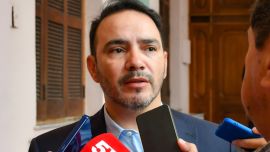A ground-breaking technological innovation its makers claim could "change everything" about modern medicine has been presented in Buenos Aires.
The new Butterfly iQ portable ultrasound device was presented to students and faculty at the Facultad de Medicina de la Universidad de Buenos Aires on Monday. It's an advancement that “will change everything,” according to Laurent Faracci, CEO of Butterfly Network.
The company, which presented its new product in conjunction with Corporación América, says its mission is to 'democratise' medical imaging through the advancement of technology.
Butterfly iQ, which went public only six months ago, is a portable ultrasound imaging device that is compatible with the average smartphone and capable of imaging the entire body.
The company designed the machine, which can be carried in a pocket and whose size and shape is similar to that of an electric shaver, to produce high-quality images, at any time and place, allowing health professionals to have data to confirm or rule out a diagnosis and immediately indicate a treatment programme.
Bone fractures, pneumonic lungs, signs of congestive heart failure, neurogenic bladders — you name it. Butterfly iQ produces images of identical quality to that of ultrasound machines that can cost upwards of US$50,000, its makers claim.
“It’s ultrasound on a chip,” said Chief Medical Officer John Martin. “It has 9,000 tiny little drums that vibrate and create an ultrasound beam, that can scan the entire body and plug into something that many have around the world: a smartphone.”
Martin explained that a device like Butterfly iQ is not only impressive for its ingenuity, but rather for its capacity to completely alter the global healthcare industry.
“For the last 200 years, no matter where you saw a doctor, we practice the same way all over the world,” Martin told the Times, noting the rote nature of taking one’s medical history, conducting a physical examination, followed by an evaluation — which, more often than not, requires some sort of diagnostic exams, be it imaging or bloodwork.
“Two thirds of the time—when we don’t know what the problem is—ultrasound can solve the uncertainty,” he added.
The delay in receiving results, anxiety, and the cost of a typical ultrasound create immense inefficiencies in the healthcare system which, according to Martin, can be solved with an ultrasound that could even be performed by the patient themselves.
Martin himself, upon noticing a lump on his neck, imaged and diagnosed his own cancer with the device.
“Trust me, it’s much more fun being the doctor than the patient,” said the medical expert, who is now healthy and doing well.
The Argentine angle
The potential impact of such a device isn't hard to imagine. In a large country like Argentina – where rural towns are often many miles away from the nearest hospital – it could be a gamechanger.
The device, which has already been approved by the the US Food and Drug Administration (FDA) and cleared all cybersecurity HIPPA requirements, is already in 15 countries . Argentina is the company’s first South American target.
“Education is the key — without education there is no future,” said Faracci, emphasising the importance of partnering with medical schools around the globe so that future leaders in the field become comfortable with the technology.
The technology is easy to use, and, with the help of artificial intelligence, patients can receive real-time assistance in capturing the best image, said Butterfly Network offcials. However, doctors and physicians will still be critical in interpreting the image and deciding what happens next.
“We believe this will only create jobs,” said Faracci, noting how reducing inefficiencies in the system will allow healthcare professionals to dedicate their time to more pressing matters.
The company says it is eager to bring the technology to Argentina soon. Prior to the presentation, company executives met with Dr. Gines González García and his team at the Health Ministry, to show off the possibilities of Butterfly iQ and discuss its possible future use in various projects and pilot programnes.
The executives noted that, at the end of the day, the product is suited for a public health system like that of Argentina. With a mission to democratise healthcare, the company is eager to get started and make headway across the continent.
“I don’t expect it to take very long,” said Faracci.



















Comments